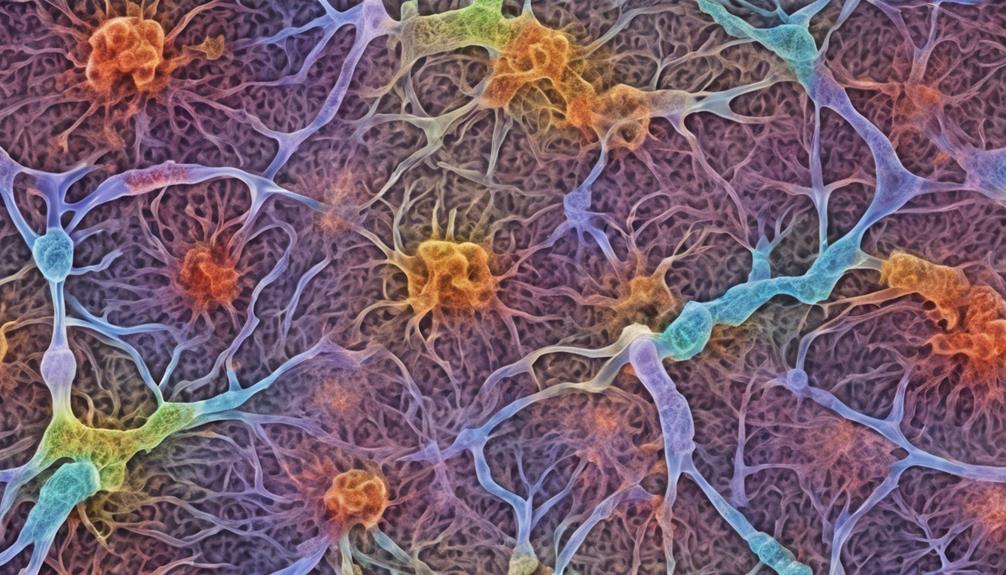As we delve into the obstacles impacting Teresa Heinz Kerry’s health, there are discussions about the potential involvement of dementia. Given her recent hospital stay and past medical problems, there is growing speculation about the root causes of her health challenges. Curious to find out more about Teresa Heinz Kerry’s health battles and the potential factors influencing them? Continue reading to discover the details.
Could there be a connection between her current health crisis and potential cognitive decline? Let's delve into the complexities of this matter and shed light on the nuances of dementia in such circumstances.
Key Takeaways
- Teresa Heinz Kerry experienced a grand mal seizure in 2013.
- Dementia signs include cognitive decline, forgetfulness, confusion, and behavioral changes.
- Dementia diagnosis involves a multi-disciplinary approach and advanced imaging techniques.
- Early detection of dementia crucial for timely medical intervention and support systems.
Teresa Heinz Kerry's Health Background
In 2013, Teresa Heinz Kerry experienced a grand mal seizure, likened to an electrical storm in the brain, which led to critical medical attention and subsequent evaluation at Massachusetts General Hospital. Prior to this event, Teresa Heinz Kerry had a history of being treated for breast cancer in late 2009. Her treatment included lumpectomies and radiation therapy. The care she received for her breast cancer played a crucial role in her overall health management.
Massachusetts General Hospital, known for its expertise in various medical specialties, was the facility where Teresa Heinz Kerry was evaluated after her seizure. The hospital's reputation for providing high-quality care to patients, including those with complex medical conditions, was instrumental in her assessment.
Teresa Heinz Kerry's health background, encompassing her battle with breast cancer and the medical attention she received at Massachusetts General Hospital, underscores the importance of comprehensive healthcare management in promoting overall well-being.
Signs and Symptoms of Dementia

Teresa Heinz Kerry's health background, particularly her medical history involving critical conditions like breast cancer, prompts an exploration of the signs and symptoms associated with dementia. Dementia is characterized by cognitive decline that interferes with daily life. Common signs include forgetfulness, confusion, disorientation, difficulty completing tasks, and challenges with problem-solving. Behavioral changes such as agitation, aggression, wandering, and social withdrawal can also indicate dementia.
Physical symptoms like difficulty with coordination, balance, and motor functions may manifest in individuals with dementia. Early detection and diagnosis are crucial for managing symptoms, providing appropriate care, and planning for the future. Given Teresa Heinz Kerry's prominence as the widow of former U.S. Secretary of State John Kerry, understanding the signs and symptoms of dementia is essential for caregivers, healthcare professionals, and individuals who may be affected.
Medical Assessments and Diagnosis
Upon presentation of concerning symptoms, a comprehensive medical assessment is essential for accurate diagnosis and evaluation of potential health conditions. When it comes to individuals like Teresa Heinz Kerry, thorough medical assessments play a crucial role in determining the presence of conditions such as dementia.
Here are three key points to consider:
- Multi-disciplinary Approach: Medical assessments for conditions like dementia often involve a team of healthcare professionals, including neurologists, geriatricians, neuropsychologists, and other specialists. This collaborative approach ensures a comprehensive evaluation and accurate diagnosis.
- Diagnostic Criteria: The diagnosis of dementia is based on specific criteria outlined in the Diagnostic and Statistical Manual of Mental Disorders (DSM-5) or the International Classification of Diseases (ICD-10). These criteria help standardize the diagnostic process and ensure consistency in identifying the condition.
- Advanced Imaging and Testing: In addition to clinical evaluations, advanced imaging techniques like MRI or CT scans, as well as cognitive tests, may be used to aid in the diagnosis of dementia and rule out other potential causes of cognitive decline. These tools provide valuable insights into brain structure and function, assisting in accurate diagnosis and appropriate management strategies.
Understanding Dementia and Its Impact

Medical assessments for conditions like dementia involve a collaborative team of healthcare professionals utilizing specific diagnostic criteria and advanced imaging techniques to accurately evaluate cognitive function and potential causes of cognitive decline.
While there's no public information linking Teresa Heinz Kerry to dementia, understanding the impact of this condition is crucial. Dementia encompasses a range of symptoms that impact memory, thinking abilities, and social skills, ultimately hindering daily functioning. In the United States, common types of dementia include Alzheimer's disease, vascular dementia, and frontotemporal dementia. Although more prevalent in older individuals, dementia can also affect younger people in rare cases.
Early detection is key in managing dementia, as it allows for timely medical intervention and the implementation of support systems for both individuals with dementia and their families. By recognizing the symptoms and effects of dementia, healthcare professionals can provide appropriate care and support to enhance the quality of life for those affected by this condition.
Debunking Myths and Clarifying Facts
In the realm of healthcare discussions surrounding dementia, it's crucial to dispel misconceptions and provide accurate information based on verified sources and medical expertise. When it comes to Teresa Heinz Kerry, there's no credible information or public reports suggesting that she has dementia. Her recent medical condition was related to a grand mal seizure, not dementia.
Dementia is a separate medical condition characterized by cognitive decline, memory loss, and impaired thinking abilities. Here are three essential points to consider:
- Verified Information: Always rely on verified sources and consult medical professionals when seeking information about someone's health status.
- Avoid Speculation: Speculating about a person's health, especially without evidence, can lead to spreading misinformation and potentially harm the individual.
- Medical Conditions: Differentiate between various medical conditions; in Teresa Heinz Kerry's case, she was treated for breast cancer and experienced a grand mal seizure, not dementia.
It is essential to approach discussions about health with caution, accuracy, and respect for individuals' privacy and well-being.
Frequently Asked Questions
What Happened to Teresa Heinz?
We observed that Teresa Heinz Kerry suffered a grand mal seizure, leading to her hospitalization.
Her condition was upgraded from critical to fair, and doctors at Massachusetts General Hospital are evaluating her.
This medical emergency occurred amidst her history of involvement in her husband's political campaigns.
The situation is being closely monitored, and we remain hopeful for her recovery.
Who Is the Heir to the Heinz Family?
We're discussing the heir to the Heinz family. Teresa Heinz Kerry is the heiress to the Heinz ketchup fortune through her late husband, Senator John Heinz.
Following his tragic death in 1991, she inherited a significant portion of the family wealth. Teresa has since been active in philanthropic endeavors and environmental advocacy, leveraging her connection to the Heinz family legacy for charitable projects.
What Family Owns Heinz Ketchup?
We, the Heinz family, are the proud owners of Heinz Ketchup. Our legacy in the ketchup industry spans generations, dating back to the late 1800s.
The Kraft Heinz Company, a multinational food and beverage giant, was formed through a merger with Kraft Foods Group in 2015.
Heinz Ketchup remains one of the most recognized and beloved ketchup brands globally.
Conclusion
In conclusion, Teresa Heinz Kerry's health condition is currently under evaluation by medical professionals. While speculation about dementia has arisen, it's important to await official assessments and diagnoses.
Let's not jump to conclusions before all the facts are known. Like a puzzle missing a few pieces, we must patiently wait for the full picture to emerge.










